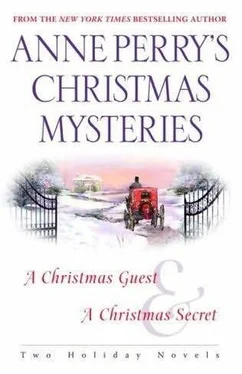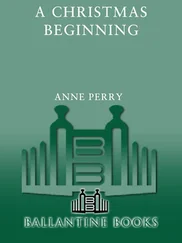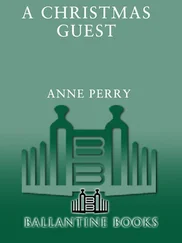“What is the difficulty, Mrs. Corde?” Boscombe said with concern.
Boscombe served the barley soup into a blue-and-white bowl and set it on the table in front of Clarice, who thanked him. Suddenly she realized how difficult it was to explain her problem without lying, at least by implication.
Boscombe was waiting, eyes wide.
She must speak. “I…I was going through the Reverend Wynter’s account books and I found certain…”
He was staring at her, something in his look darkening.
She could think of nothing to excuse what she had done, except the truth. Fitzpatrick had no authority to order her silence. Everyone would have to know at some time, perhaps even by tomorrow. She plunged in. “The Reverend Wynter is dead,” she said very quietly, sadness overwhelming her. “We found his body quite by chance…in the second cellar. I went for coal and the cat followed me down. I…” She looked at him and saw the shock in his face, followed immediately by a terrible regret. He turned to look at Genevieve, then back at Clarice.
“I’m so sorry,” he said a little huskily. “What happened? I…I hadn’t heard.”
“No one has,” she said quietly. “Dr. Fitzpatrick asked us not to tell anyone until the bishop has been informed, but…” This was the difficult part. “But we disagree upon what happened. However, I would be grateful if you would not let people know that I told you, at least not yet.”
“Of course not,” he agreed. “That is why you were going through the account books?” He still seemed puzzled, but there was an inexplicable sense of relief in him, as if this wasn’t what he had feared.
“Yes.” She knew she had not yet said enough for him to understand. It was unavoidable now. “You see…” What she had planned sounded ridiculous.
“Yes?”
Genevieve also had stopped her work and was listening.
Clarice felt the heat burn up her face. “You see, I don’t believe he died by accident,” she said. She hated the sound of her voice. It was wobbly and absurd. She cleared her throat. “I think someone hit him. He had injuries both on his face and on the back of his head. They may not have meant to kill him, but…” She was telling them too much. “…but there was someone else there, and they didn’t tell anyone.” She turned from Boscombe to Genevieve. “He was lying all by himself in the second cellar, but he had no lantern,” she went on. “Who’d go into a cellar without a lantern?”
“No one,” Genevieve said quietly. “But why would anyone quarrel with the Reverend Wynter? He was the nicest man…” She stopped.
For a moment they all were silent: Clarice and Boscombe at the kitchen table, Genevieve standing with the bowl still in her arms.
“Do you think it’s the money in the church accounts?” Boscombe asked finally, his face smooth, his eyes avoiding Genevieve’s. “Surely there’s hardly enough there to provoke a quarrel?”
“No,” Clarice agreed. “It’s only pennies missing, a shilling or two at the most. But it happened a lot of times, over six months or more.”
Genevieve was looking at Boscombe; staring at him.
Boscombe sat still, his back stiff.
He knows, Clarice thought, the conviction growing in her mind. He knows the Reverend Wynter was putting the money back. But had the vicar known who was taking it? Was that what he had been trying to find out all those months, and had at last succeeded? And was killed for? No, that was absurd. As she had said before, it was pennies!
Boscombe was watching her, his face tense with concentration, waiting.
“You knew, didn’t you?” Clarice said very softly. “Is…is that why you stopped working with the Reverend Wynter? Because you knew he was protecting someone who…”
His eyes were wide, his face almost comical with disbelief.
“You didn’t…,” she went on, answering her own question.
“No! Oh, I knew there were pennies missing here and there,” he assured her, shifting a little in his seat. “At first I thought it was just that the Reverend Wynter was a bit careless, or even that he wasn’t very good at his sums. Then I realized that in the end the figures were always exactly right, so he knew someone was taking bits and pieces. But I didn’t object to his dealing with it in his own way.”
“Did he know who it was?” she asked.
Boscombe smiled. “He didn’t tell me.”
She knew he was speaking the literal truth, but there was a real truth, a more whole and honest one, that he was concealing. “But he knew,” she insisted. “As you did?”
“No, I didn’t. But even if I had, Mrs. Corde, I’m not sure that I would be free to tell you.”
She leaned forward a little across the table, her elbows on its pale, scrubbed wood. “I think the Reverend Wynter was killed by someone, Mr. Boscombe. They may not have set out to, but they hit him, and when he was dead, or dying…” She saw him wince, but she went on. “…they dragged him into the farther cellar and took the lantern to go back upstairs, leaving him alone there in the dark, for days. It may not have anything to do with the money-it’s so small it’s meaningless. But it has to do with something!”
Genevieve shivered. “If that’s true, John, then an awful thing has happened. Perhaps you should tell the Reverend Corde, even if you can’t tell Mrs. Corde.”
He looked at her at last. “The Reverend Wynter knew,” he admitted. “At least I believe he did, but it was something else, something bigger behind it, and he wanted to know what that was. The greater sin.”
“Do you suppose he found out?” Clarice asked him.
He bit his lip. Now his face was pale. They were talking about something so dark it had caused the death of a good man, and perhaps the damnation of another.
“I prefer to think not,” he said slowly. “At least for as long as I can think it.”
“But, John…” Genevieve began, and then her voice trailed away.
“I don’t know,” he said again. “And that’s the truth.”
Clarice could draw no more from him. She thanked them both and left as the children trooped in from the garden, bright-faced, eyes dancing, skin glowing from the exertion. In the sudden confines of the warm kitchen with its scrubbed table and floor, its familiar, precious, but mismatched china, and the smell of drying linen and herbs, their voices were louder than they realized. Violence seemed like an offensive word-and utterly inappropriate.
***
It was early afternoon when Dominic decided to call again at the manor house. He had to put his trust in someone, or else simply abandon the idea of finding out exactly how the Reverend Wynter had died. It still seemed an absurd idea that anyone could have killed him.
It was below freezing, even at this hour, and his feet crunched on the snow. He walked as quickly as he could, his mind also racing. The decision he made now could affect the rest of his life, and-of more urgent importance to him-Clarice’s life also. She had given up much to marry him, and he wanted passionately that she should never regret that. He found to his surprise that as he learned to know her better with each passing month, he loved her more. She had an honesty of mind that was brighter, more translucent than any he had imagined. He kept thinking he knew her, and then she said or did something that surprised him. She made him laugh, even when he did not want to. She never complained about the lack of money, or about the small, grubby accommodations she had to make to poverty or Spindlewood’s petty officiousness.
Then she would blow up with temper over an injustice, and put into irretrievable words exactly what he had been thinking, only been wise enough not to say. Or was that cowardly enough? Or was he simply older and more acquainted with the infinite possibilities of failure?
Читать дальше










